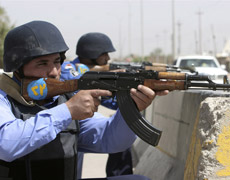
March 31, 2008 | Author: Greg Bruno
The recent explosion of intra-sect violence (NYT) in Baghdad, Basra, and other Iraqi Shiite strongholds has ominous implications for the U.S. and Iraqi governments. The reemergence of fighters loyal to cleric Muqtada al-Sadr threatens to reverse security gains since an additional thirty thousand U.S. soldiers flooded Baghdad in 2007.

Dozens have been killed and hundreds wounded in the fighting. The uptick in violence also comes as presidential candidates debate the long-term U.S. commitment to Iraq and the White House contemplates a pause in troop withdrawals (FT). Baghdad, meanwhile, has more immediate concerns. Prime Minister Nouri al-Maliki, who ordered the Iraqi-led operation in Basra, faces political peril if he fails, argues Radio Free Europe/Radio Liberty analyst Sumedha Senanayake. Indeed, some experts say the future of Iraq is as dependent on the successful resolution of intra-Shiite fighting as the defeat of Sunni extremist groups like al-Qaeda in Iraq.
Whether Maliki and his beleaguered government have the clout to permanently quell the strife is far from certain. After nearly a week of clashes, Sadr ordered his militia to halt operations (RFE/RL) on March 30, and calm returned to Baghdad and Basra soon after. But McClatchy reports Iranian intervention had a significant role in securing the ceasefire, prompting some experts to suggest Maliki’s political standing has suffered. Qassim Daoud, a former national security adviser and Shiite party leader, says Maliki’s failure to disarm the militia leaves his government “in a weak position” (NYT). Maliki’s troubles may not be the most important aspect of the stand-off, however. CFR Adjunct Senior Fellow Vali R. Nasr tells CFR.org the true players in the dispute are Sadr and rival Shiite cleric Abdul Aziz al-Hakim. Both control powerful militias, and both command important political blocs in Iraq’s evolving power structure. “Maliki is completely irrelevant” in the dispute in the south, Nasr says.
Hakim’s Islamic Supreme Council of Iraq (ISCI) and associated militant wing, the Badr Brigade, have a history of clashes (FT) with Sadr’s Mahdi Army. In a November 2007 report, the International Crisis Group assessed the rivalry as a class struggle between “the Shiite urban underclass,” represented by Sadr, and wealthier Shiites in Baghdad and the holy cities, represented by ISCI. Washington has thrown its weight behind Hakim, who has close historic ties to Iran (including siding with Iran’s mullahs during the eight-year Iran-Iraq War). Some observers see the recent violence as an attempt by Hakim to reshape the political landscape ahead of provincial elections (VOA) slated for October 2008, while Sadr’s militia has returned to arms as a countermeasure.
The recent Shiite fighting follows a pledge by the Iraqi commander in charge of forces in the south to clear militias from Basra, the country’s economic hub and only major port. During a flyover of the city on March 25, Maliki justified the deployment (Independent) of fifteen thousand army and police officers: “We had to do this, because Basra was experiencing a brutal campaign from internal and external gangs targeting its security and stability.”
Sadr sees things differently. Members of his Mahdi Army have grown increasingly frustrated with what they say are targeted attacks by U.S. and Iraqi security forces. (The U.S. military, meanwhile, says Iraqi forces are targeting “outlaws” backed by Iran). Sadr, whose February cease-fire extension appears to have come undone, called on followers to practice civil disobedience (Alsumaria) in protest of such treatment. They don’t appear to be listening. “The cease-fire is over; we have been told to fight the Americans,” one Mahdi Army militiaman told the Christian Science Monitor. Such bluster could have lasting implications for Iraqi security. Maliki’s focus on Basra could lead to a Shiite backlash, especially in cities where the Iraqi government is weak (TIME). Brian Katulis, a senior fellow at the Center for American Progress, writes that U.S. efforts in Iraq have only “masked tensions between rival groups competing for power.” The solution, he adds, is to leave reconciliation to the Iraqis.


